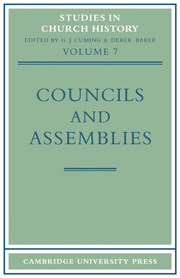Book contents
- Frontmatter
- Preface
- Contents
- Contributors
- Abbreviations
- Public welfare and social legislation in the early medieval councils (Presidential Address)
- National synods, kingship as office, and royal anointing: an early medieval syndrome
- The case of Berengar of Tours
- Ecclesiastica and Regalia: Papal investiture policy from the Council of Guastalla to the First Lateran Council, 1106–23
- Viri religiosi and the York election dispute
- Councils and synods in thirteenth-century Castile and Aragon
- The Byzantine reaction to the Second Council of Lyons, 1274
- The Council of London of 1342
- Education in English ecclesiastical legislation of the later Middle Ages
- The representation of the universitas fidelium in the councils of the conciliar period
- Nicholas Ryssheton and the Council of Pisa, 1409
- The condemnation of John Wyclif at the Council of Constance
- Some aspects of English representation at the Council of Basle
- The Council of Basle and the Second Vatican Council
- The Colloquies between Catholics and Protestants, 1539–41
- King James I's call for an ecumenical council
- John Hales and the Synod of Dort
- Assembly and Association in Dissent, 1689–1831
- The Convocation of 1710: an Anglican attempt at counter-revolution
- Laymen in synod: an aspect of the beginnings of synodical government in South Africa
- The First Vatican Council
- Kikuyu and Edinburgh: the interaction of attitudes to two conferences
Public welfare and social legislation in the early medieval councils (Presidential Address)
Published online by Cambridge University Press: 12 March 2010
- Frontmatter
- Preface
- Contents
- Contributors
- Abbreviations
- Public welfare and social legislation in the early medieval councils (Presidential Address)
- National synods, kingship as office, and royal anointing: an early medieval syndrome
- The case of Berengar of Tours
- Ecclesiastica and Regalia: Papal investiture policy from the Council of Guastalla to the First Lateran Council, 1106–23
- Viri religiosi and the York election dispute
- Councils and synods in thirteenth-century Castile and Aragon
- The Byzantine reaction to the Second Council of Lyons, 1274
- The Council of London of 1342
- Education in English ecclesiastical legislation of the later Middle Ages
- The representation of the universitas fidelium in the councils of the conciliar period
- Nicholas Ryssheton and the Council of Pisa, 1409
- The condemnation of John Wyclif at the Council of Constance
- Some aspects of English representation at the Council of Basle
- The Council of Basle and the Second Vatican Council
- The Colloquies between Catholics and Protestants, 1539–41
- King James I's call for an ecumenical council
- John Hales and the Synod of Dort
- Assembly and Association in Dissent, 1689–1831
- The Convocation of 1710: an Anglican attempt at counter-revolution
- Laymen in synod: an aspect of the beginnings of synodical government in South Africa
- The First Vatican Council
- Kikuyu and Edinburgh: the interaction of attitudes to two conferences
Summary
The reason for singling out the early medieval period is not only because it constituted the age of infancy, puberty, and adolescence of what later became Western Europe, but also because some of the relevant issues stand out much more clearly when they make their first appearance, that is, before they have become overlaid, encrusted, if not suffocated, by subsequent developments. The recognition of these issues is facilitated by the (comparatively speaking) simple social structure and by the low-geared exigencies of society itself. It is only in retrospect that one can appreciate, measure, and assess the achievements—or their lack—of any age, and this truism applies with particular force to the period between the sixth and ninth centuries, for it was in these centuries that the firm foundations of medieval and to a large extent of modern Europe were laid.
The choice of my subject is to express the conviction that some of the great merits of modern welfare institutions and modern social legislative measures have their definite and demonstrable roots, not in antiquity, not in the high Middle Ages, not in the nineteenth century, but roughly speaking in the Frankish age. And here it was the councils which were the chief organs either in initiating legislation or in establishing welfare institutions and making arrangements for the execution of their decrees as far as this lay in their competency. The councils to my mind constitute a vast reservoir of source-material which from the angle of my subject has barely been tapped.
- Type
- Chapter
- Information
- Councils and Assemblies , pp. 1 - 40Publisher: Cambridge University PressPrint publication year: 1970



